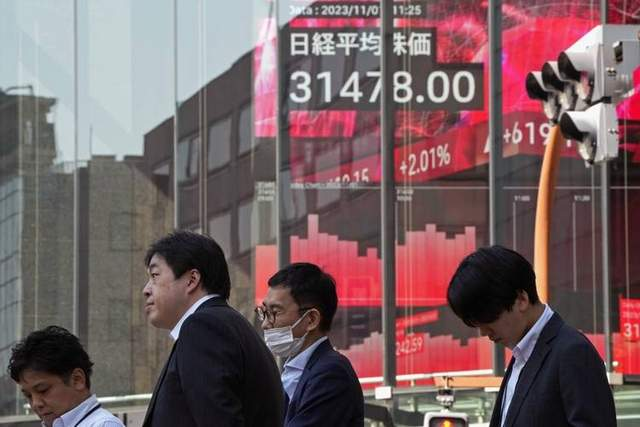
Recently, Japan's first quarter GDP data has attracted global attention. The real GDP fell by 0.5% month-on-month, and the annualized rate of contraction reached 2.0%. The degree of economic downturn was far beyond expectations. Institutions such as Goldman Sachs and JPMorgan Chase have downgraded their economic outlook ratings.
Behind the data, Japan's economic structural problems are prominent. Exports, as a key driving force for economic growth, fell by 5.0% month-on-month this quarter, and the annual rate plummeted by 18.7%, the first time in nearly four quarters. In the automotive industry, Toyota, Honda and other automakers have been hindered from shipping new cars due to certification violations, and their market share in major overseas markets such as the United States and Europe has declined, and their revenue and brand reputation have been damaged. At the same time, private residential investment fell by 2.5% month-on-month, and equipment investment fell by 0.8% month-on-month, both of which fell for the first time in two quarters. Due to the unclear economic outlook, people's consumption desire is sluggish, the real estate market has been cold, and both new property sales and second-hand housing transactions have been affected, and the development of related upstream and downstream industries has been restricted. Companies have also reduced their investment due to weak demand and uncertain prospects. For example, Sony has suspended the expansion of some production lines and Panasonic has cut its budget for promotion in emerging markets, further suppressing economic vitality.
Japan's economic difficulties are the result of internal and external troubles. As an export-oriented economy, Japan is highly dependent on exports and has been hit hard by trade frictions. After the United States imposed tariffs on automobiles, Toyota and Nissan's stock prices fell sharply in a short period of time. It is estimated that if the United States imposes a 25% tariff on Japanese automobiles, Japanese companies' profits will be reduced by up to 1.75 trillion yen. Industries such as electronics and machinery have also experienced difficulties in expanding overseas markets, a sharp drop in orders, and shrinking revenues, with some companies on the verge of losses.
Faced with difficulties, the Japanese government has responded positively. Prime Minister Shigeru Ishiba called the US "reciprocal tariffs" a "national disaster" and sought negotiations with the United States, but the United States has closed the door to negotiations after failing to obtain tariff exemptions. The Ministry of Economy, Trade and Industry has established a "reciprocal tariff countermeasures headquarters" to assess the impact of tariffs and study countermeasures, such as analyzing the impact of costs, prices, and sales on the automotive industry, and proposing suggestions for optimizing the supply chain. The government has also set up about 1,000 consultation windows across the country to support small and medium-sized enterprises, and is considering compiling a supplementary budget to invest hundreds of billions of yen in subsidies for companies affected by tariffs.
However, these countermeasures are difficult to implement. The outcome of negotiations with the United States is unknown, the United States has a tough attitude, Japan is at a disadvantage, and Japan has also found it difficult to gain enough benefits in previous negotiations. The US tariff policy has exacerbated economic uncertainty, compressed the room for the Bank of Japan to adjust its monetary policy, and traditional stimulus measures have been ineffective and may cause new problems. Enterprises are promoting localized production, facing large initial investments in land, factories, equipment, and other areas, as well as difficulties in adaptation and easy leaks in technology transfer.
The decline of related industries in Japan has impacted the global industrial chain. Due to a shortage of key parts in the automotive industry, Volkswagen and other automakers have reduced production and stopped production, disrupting production plans and increasing costs. In the electronics industry, if Japan's technological advantages in semiconductor materials and high-end chip manufacturing are weakened, it will affect the innovation speed and production efficiency of the global electronics industry. For example, some of Apple's high-end chips rely on Japanese technology, and the weakening of its technological advantages will hinder Apple's new product development and slow down the pace of global electronic product updates.
How long will the "winter" of the Japanese economy last? Can it bottom out and rebound? Or will it fall into a deeper recession? This is not only a difficult problem for the Japanese government and enterprises, but also a focus of global economic observers. Its subsequent development has far-reaching implications and deserves continued attention and analysis.

報告顯示,中國電力投資加速增長,預計2024年電網基建投資將超過5300億元。
近日,市場迎來了一則引人注目的消息:工業巨頭3M公司(MMM.N)在本周五公布了其季度業績報告,隨後股價飆升至近兩年來的
最近,外媒給OpenAI算了筆賬,今年可能要血虧50億美元。
近日,巴黎奧運會和世界鐵人三項協會聯合發布了一項重大決定,宣布因塞納河水質污染問題,原定於近期進行的奧運會鐵人三項首次下
當地時間7月18日,法國巴黎發生了一起令人震驚的持刀襲警事件。
近期,一則重大消息在國際舞臺上引起軒然大波,馬來西亞宣布加入金磚國家。
調查發現,互聯網和智能手機的使用幹擾了韓國近五分之一學生的生活。